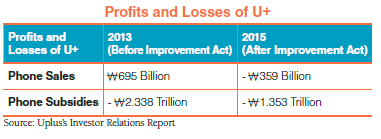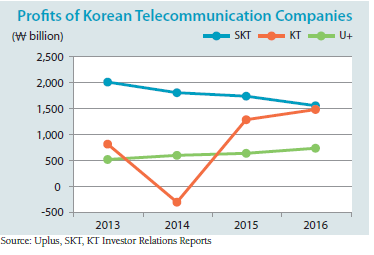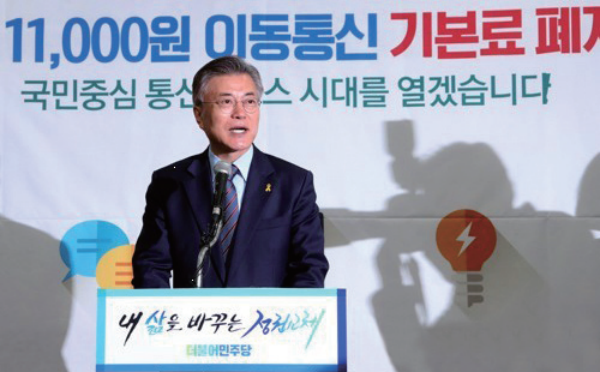The Mobile Device Distribution Improvement Act was amended on October 1st of this year after three years of intense criticism since its implementation. With consumers changing phones more than ever due to this recent amendment, the government is proposing various methods to reduce telecommunication expenses in Korea. The Sungkyun Times (SKT) now explains the background of the consumers’ recent complaints on telephone expenses, the responses of telecommunication companies in Korea, and the Korean government’s role in the discussions to come.
Market Distortion Caused by the Mobile Device Distribution Improvement Act
Korean consumers’ dissatisfaction with telecommunication expenses started when the Mobile Device Distribution Improvement Act was implemented in 2014. The act stated that subsidies provided on phone purchases must be indiscriminative and not excessive. This law was passed to prevent the unfair subsidy culture that is easily found in Korea. Phone purchases in Korea usually take place in telecommunication company agent stores, and customers often purchase the same phone at different prices due to the unclear amount of financial support. Consumers who are familiar with the phone market generally had a higher chance of finding a cheaper deal. The Mobile Device Distribution Improvement Act sought to get rid of this disparity by forcing stores to clearly state the amount of subsidies provided. A limit of 350,000 on subsidies was also decided on to ensure that any financial losses of customers due to disobeying stores would be kept to a minimum.
This new policy, however, did not work out as well as expected and caused further distortion in the telephone market. The presence of a subsidy limit itself was enough to make telecommunication companies less eager regarding price competition. Telecommunication companies now had few reasons to use subsidies as a tool to win over new customers, and the maximum amount of 350,000 was rarely provided. On the other hand, since less financial support was given upon phone purchases, customers did not change their phones as much as they did before. According to the Korean Telecommunications Operators Association (KTOA), the annual change of phone numbers dropped from 9 million to 7 million after the implementation of the new law. As a result, telecommunication companies ultimately had to suffer from losses on phone sales.

One of Korea’s three telecommunication companies, LG Uplus, lost more money from phone sales than the money they reduced on subsidies after the new policy. Uplus lost 70 billion in total and other telecommunication companies suffered similarly. To make up for this new element of loss, telecommunication companies reduced their phone sale marketing budgets and subsidies even further.
Although the national average of telecommunication expenses per family decreased from 150,350 to 144,001 during the enforcement of the Mobile Device Distribution Improvement Act, customers are very dissatisfied with this issue. High telecommunication expenses were somewhat accepted in the past because it was possible to purchase cheap phones in exchange. After the new law, however, it became difficult to receive sufficient phone subsidies, but the telecommunication expenses were still expensive, causing people to express their frustrations on this situation.

The Mobile Device Distribution Improvement Act have made it so that consumers buy expensive phones and pay costly telecommunication expenses, while increasing the profits of telecommunication companies who no longer compete with each other over phone sales. Customer dissatisfaction regarding telecommunication expenses naturally surfaced, and became a popular topic during the presidential election campaign.
Telecommunication Expenses Reduction Policies
Amendment of the Mobile Device Distribution Improvement Act
After receiving constant public criticism since 2014, the Mobile Device Distribution Improvement Act was amended on October 1st, 2017. The changed regulations no longer limited the maximum subsidy for phone purchases, but maintained the indiscriminative rule which was not very controversial. Telecommunication companies are now expected to reinitiate the competition on phone sales as the number of changes of phone numbers increased twice as high as before, according to KTOA. The difference from three years ago is that fair purchases for customers will be guaranteed as the subsidy needs to be clearly stated. This amendment is not an immediate reduction policy, but it is a start by prompting competition between companies once again.
Government’s Telecommunication Expenses Reduction Campaign

As mentioned before, telecommunication expenses reduction was a popular topic during the Korean presidential election campaign this year. The elected party announced eight policies to reduce telecommunication expenses back then, with the amendment of the Mobile Device Distribution Improvement Act being one of them. The remaining policies of attention include ‘abolishment of telecommunication basic fees,’ ‘divided notice of phone prices,’ and ‘inducement on telecommunication companies’ to lower phone bills.
Telecommunication basic fees refer to the 11,000 that is included in every payment plan provided by telecommunication companies. The idea of abolishing this basic fee was promoted on numerous occasions during the presidential campaign. The realization of this pledge, however, is not very likely to occur since the majority of the basic fees are used on communication quality equipment and related facilities that need constant maintenance. As well, the government has not brought up this topic since July.
The divided notice of phone prices is a policy demanding that states telecommunication companies and manufacturing companies must clarify the proportion of the phone prices they are profiting from. This policy aims to reduce telecommunication expenses in the long-term by pressuring both manufacturers and telecommunication companies to drop prices. The divided notice policy has a high chance of being passed because there is no opposition from any party of interest, but it will not bring immediate reductions in telecommunication expenses.
Lastly, the inducement on telecommunication companies to lower phone bills was partly carried out by increasing the discount rate of selective contracts from 20% to 25% on September 15th. Even though 27 million customers are known to be benefiting from this system, there are many complaints claiming that there is no significant change in telecommunication expenses. The government accepted this criticism and suggested a new policy that was not part of the original telecommunication reduction plan.
Establishment of a 100% Self-sufficient System
The new policy was a 100% self-sufficient system, which forbids telecommunication companies from selling phones in any shape or form whatsoever. In other words, purchasing phones at telecommunication agent stores will not be possible anymore since it will be made illegal. According to a mobile market statistics enterprise, Strategy Analytics, the global average percentage of phones purchased through self-sufficient sources other than telecommunication agent stores is 61%, but the percentage is only 8% in Korea. The universal method of phone purchases in other countries usually consists of buying a phone and going to a telecommunication agent store afterwards to activate it. In Korea, however, many people are buying expensive phones by receiving telecommunication companies’ subsidies, and paying high telecommunication rates in exchange. Consumer organizations are now demanding the illegalization of telecommunication agent store phone purchases, along with a reduction in phone bills. This extreme measure was proposed on September 18th, and discussions regarding this system are going back and forth.
Government’s Tasks in Reducing Telecommunication Expenses
Direct Investment Expected from the Government
The current ‘spectrum price’ that the Korean government collects from telecommunication companies is over 1.3 trillion annually. Spectrum prices are a type of usage fee that is paid in order to secure a certain frequency range for wireless communication. Since the frequencies of radio waves have a direct connection with the quality of wireless communication, telecommunication companies compete with each other to win the best frequency possible. This competition is decided through a national spectrum auction, and the final prices are very often over 1 trillion.
Moreover, the three telecommunication companies in Korea are charged a ‘radio wave usage fee’ which has a double taxation nature about it. This kind of excessive tax collection resulted in 4.5% of the telecommunication companies’ revenue, which was six times higher than Japan’s 0.77% and two times higher than the United States’ 2.42%. Korea’s telecommunication companies are severely overtaxed compared to other countries, but are recently feeling constant pressure to lower their telecommunication prices. When the companies requested a lessening of frequency usage fees in order to drop their telecommunication rates, the Korean government rejected the request with no room for discussion. In fact, a public pledge to force telecommunication companies to submit reduction plans exists.
The Korean government’s announcements regarding telecommunication expense reductions and their actions that show no sign of direct investment or sacrifice contradict each other. The abstract concept of distributing frequency ranges to companies results in profits of trillions of won which can be used to support telecommunication users, but only 1.8% is returned for telecommunication welfare according to Yonhap News. Reduction policies announced by the government up to now are only focused on pressuring companies, but direct investments must be made from the government in order for the reductions to be realized.
Discussions on More Practical Measures
The government’s announced policies up until now may look very attractive, but many are unachievable. 60 million phones are known to be active in Korea according to Kyunghyang Shinmun, which is more than the number of Korean citizens. If the basic telecommunication fee of 11,000 from these 60 million phones was abolished, telecommunication companies in Korea would have to deal with a loss of 660 billion. This kind of policy is too much of a burden for companies, and discussions regarding this matter will not be very productive because the idea itself is irrational.
The 100% self-sufficient system mentioned above is not very practical either. The illegalization of phone sales in agent stores will result in 100,000 unemployed people, as the Korean Mobile-device Distribution Association (KMDA) argues. A solid reason to insist on a 100% self-sufficient system lacks evidence as well. Countries do not particularly persist on a 100% self-sufficient system as can be seen in the global average of 61% and the sudden increase of Korea’s 8% to 100% is expected to bring negative side effects with it.
Some experts argue that the government should not pressure telecommunication companies at all, since the current distortion in the telecommunication market is a result of the Mobile Device Distribution Improvement Act to begin with. Lee Byung-tae, a professor of Business Administration at KAIST, suggests that “the government should invest money in opening telecommunication activation chips to the public” and “make the process easier for consumers to change their telecommunication companies.” He also claimed that too much interference regarding telecommunication prices might worsen the situation and will block future investments of telecommunication industries.
Various groups of interest are sharing their voices on the recent telecommunication expense reduction policies. Since smartphones and their expenses are a part of many people’s lives in Korea, it might be meaningful to know the different aspects of the discussions that are currently taking place.
